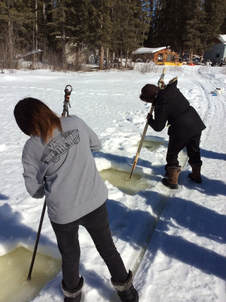 This year, the NWT On The Land Collaborative will distribute $1 million dollars in grants to 48 projects across the territory that connect NWT residents with their land, culture, and community. “Four years ago when the Collaborative was just an idea, I never imagined in such a short time we’d have a million dollars in the bank to put towards programming,” remarks Meghan Etter, the Community Advisor for the Inuvialuit Settlement Region. Community Advisors are appointed by Indigenous governments in each region to serve as representatives for the Collaborative. They provide on-the-ground support to projects throughout the process, while also assisting in the selection of recipients and in providing strategic direction to the Collaborative. The outcomes of on the land programming are as numerous as they are varied, but one thing is certain: they support the health and wellbeing of communities, families, and individuals, and are vital to healthy ecosystems and economies in the North. This is the third year the Collaborative has been administering grants to land-based initiatives in the NWT. In year one, the Collaborative gave out $381,850 to 35 projects. Last year, the pot of $634,845 was spread across 35 projects. The average grant amount continues to grow from almost $11,000 in 2016 to just over $18,000 in 2017 to almost $21,000 per project this year. This year also marks an increase in the number of projects receiving full funding. More than half of the successful applicants were fully funded. This is an important marker of success for the Collaborative, which is dedicated to making it easier and less time consuming for organizations and communities to access funds for land-based programs. As in previous years, there is a wide range of grant amounts and project types. Small grant recipients include an ice fishing program in Whatì and a land- and culture-based retreat for LGBTQ+ students and their allies in the South Slave. Medium-sized grants will allow the Ulukhaktok Community Corporation to run a summer Inuinnaqtun camp for young people in their community and Chief Julius School in Teetł’it Zheh to immerse students in traditional Gwich’in culture while travelling on Teetł’it Gwinjik (Peel River). Large grants have been awarded to the Dehcho K’ehodi Stewardship & Guardian Program and the Tulít’a Dene Band to bring elders and youth together for a walking journey along traditional Shúhtagot’ine trails. In addition to financial support, funded projects may also receive access to equipment, training, and program support. Quick Facts
Contact Steve Ellis Program Lead, Northern Canada Tides Canada Email: [email protected] Phone: 867.988.1963 Jess Dunkin Director, On the Land Programs NWT Recreation and Parks Association Email: [email protected] Phone: 867.669.8376
2 Comments
|
AuthorWrite something about yourself. No need to be fancy, just an overview. Archives
April 2021
Categories |
 RSS Feed
RSS Feed